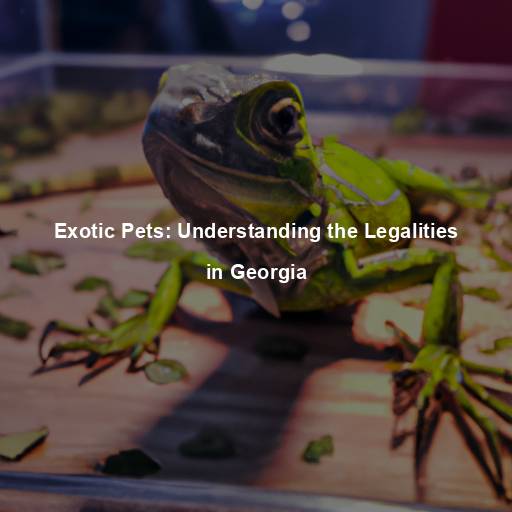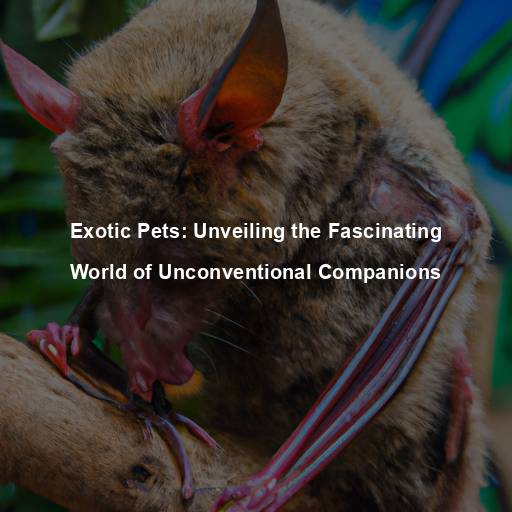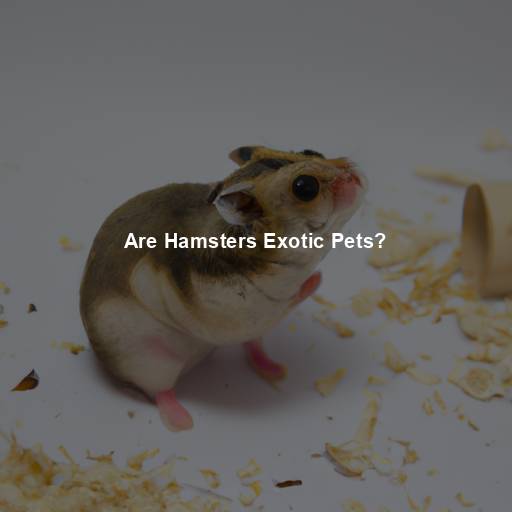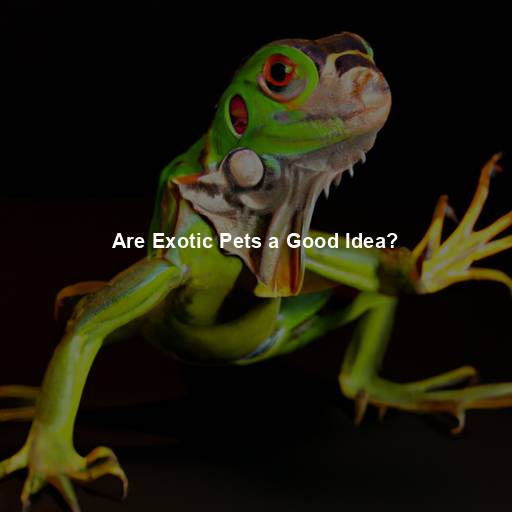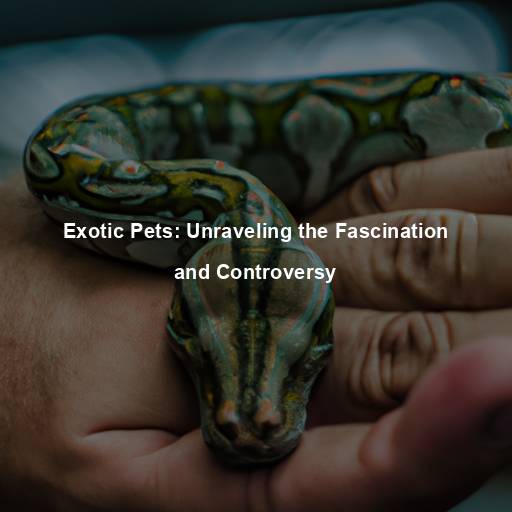Exotic Pets: Understanding the Legalities in Georgia
Last Updated on July 20, 2023 by Evan
Contents [hide]
- 1 The Fascination with Exotic Pets
- 2 The Legal Landscape
- 2.1 Georgia’s Exotic Pet Laws
- 2.2 The Georgia Department of Natural Resources (DNR)
- 2.3 Permitted Exotic Animals
- 2.4 Restricted and Prohibited Exotic Animals
- 2.5 The Permitting Process
- 2.6 Responsible Ownership and Care
- 2.7 The Importance of Education
- 2.8 Educating the Public
- 2.9 Rescue and Rehabilitation
- 2.10 Lobbying for Stricter Regulations
- 3 The Impact of Exotic Pet Ownership
- 4 Responsible Alternatives to Exotic Pets
- 5 FAQs: Exotic Pets Legal in Georgia
- 5.1 Can I legally own an exotic pet in Georgia?
- 5.2 What types of exotic pets are legal to own in Georgia?
- 5.3 Do I need a permit or license to own an exotic pet in Georgia?
- 5.4 How can I obtain the required permits and licenses for owning exotic pets?
- 5.5 Are there any restrictions on the transportation or quarantine of exotic pets in Georgia?
- 5.6 What are the penalties for illegal ownership or mistreatment of exotic pets in Georgia?
The Fascination with Exotic Pets
Exotic pets have always captured the imagination of animal lovers worldwide. From the majestic big cats to the adorable sugar gliders, these unique creatures have a certain allure that sets them apart from traditional pets. The desire to own an exotic pet stems from a deep-rooted fascination with the extraordinary and the desire to have an extraordinary companion by our side.
The Legal Landscape
Owning an exotic pet may seem like a dream come true, but before you add an unconventional companion to your household, it’s crucial to navigate the legal labyrinth that comes with it. From country to country, and even state to state, the laws regulating exotic animal ownership vary wildly. For curious souls residing in Georgia, USA, we will embark on a perplexing journey through the intricate legalities of owning exotic pets.
Georgia’s Exotic Pet Laws
In an attempt to navigate the complex world of exotic animal ownership, Georgia has joined the ranks of countless other states by implementing a series of stringent regulations. The purpose behind these laws is twofold: to safeguard the well-being of these unique creatures and, of equal importance, to shield the general public from any potential hazards that may arise from owning such unconventional companions. For both current and aspiring owners of these extraordinary pets, it becomes imperative to thoroughly acquaint themselves with the intricacies of these regulations – doing so guarantees that they remain on the right side of the law.
The Georgia Department of Natural Resources (DNR)
The Georgia Department of Natural Resources (DNR) plays a vital role in managing and enforcing regulations related to exotic pets. It is responsible for overseeing the permitting process and ensuring that individuals who wish to own exotic animals meet specific criteria.
Permitted Exotic Animals
Under Georgia law, certain exotic animals are allowed to be kept as pets, provided the owner obtains the necessary permits and meets specific requirements. The list of permitted exotic animals varies from state to state and often includes species such as non-venomous snakes, certain reptiles, small primates, and some bird species.
Restricted and Prohibited Exotic Animals
With a primary focus on safeguarding the well-being of both people and animals, the state of Georgia has implemented a stringent policy regarding the ownership of certain exotic creatures. A compilation of restricted and prohibited animals has been devised, leaving no room for interpretation or exception. Amongst the species residing on this list, one may find formidable predators like lions, tigers, and bears, while venomous serpents and select primate types are also included in the roster. In essence, Georgia’s commitment to public safety and animal welfare remains resolute, drawing a clear line between pets and untamed creatures.
The Permitting Process
Thinking about bringing home an exotic pet in Georgia? Well, pause right there, because there’s a whole permit dance you need to get through with the Georgia DNR. Brace yourself for some serious paperwork as you dive into the labyrinth of applications and pour your heart out describing the creature of your dreams. And that’s not all – you better be ready to prove that you’ve got the knowledge and resources to give that wild creature a life worth living.
Responsible Ownership and Care
Taking care of an exotic pet is no walk in the park. These incredible creatures have their own unique set of demands that must be met if they are to thrive in captivity. To ensure the well-being of the animal, it is absolutely crucial for exotic pet owners to educate themselves about the specific needs of their chosen species and go above and beyond to create an environment that meets those demands, along with providing proper nutrition and regular veterinary care.
The Importance of Education
Education is a crucial aspect of responsible exotic pet ownership. Prospective owners should thoroughly research the species they are interested in and understand their natural behaviors, dietary needs, and habitat requirements. Additionally, seeking guidance from experienced exotic pet owners or joining local exotic pet communities can provide valuable insights and support.
Educating the Public
Animal welfare organizations have a crucial mission: enlightening the masses about the intricate nuances of possessing unconventional creatures as pets. They go the extra mile to impart indispensable wisdom and guidance, empowering potential owners to navigate through the complexities involved. Moreover, these remarkable organizations curate an array of captivating events, ranging from immersive workshops and enlightening seminars to engaging online forums, where distinguished experts generously enlighten the audience with their invaluable insights and personal encounters.
Rescue and Rehabilitation
Animal welfare organizations also play a crucial role in rescuing and rehabilitating exotic animals that have been abandoned or mistreated. These organizations provide a safe haven for animals in need, offering them proper care, medical attention, and the opportunity to live in an environment that meets their specific needs.
Lobbying for Stricter Regulations
Animal welfare organizations are on a mission to make a difference in the lives of our furry friends. Not only do they educate and save these precious creatures, but they also take on the perplexing challenge of advocating for tighter rules when it comes to exotic pet ownership. By teaming up with lawmakers and other key players, they strive to develop legislation that not only safeguards animals but also keeps the public safe from the risks that come with owning these unconventional companions. It’s a burst of hope in a chaotic world where these organizations fight tooth and nail to bring about positive change.
The Impact of Exotic Pet Ownership
Owning exotic pets is like navigating a wild jungle of pros and cons, leaving you with a sense of wonder and perplexity. On one hand, these extraordinary creatures can bring an exotic charm into our lives, turning our homes into a menagerie of fascination. On the other hand, we cannot ignore the challenging complexities that come with their ownership – the ethical responsibility, the ecological impact, and the potential risks to both the animals and our communities. Before taking the leap into the world of exotics, it is vital to unravel these enigmatic threads and truly understand the implications of welcoming these extraordinary companions into our lives.
Conservation Concerns
One of the primary concerns associated with exotic pet ownership is the impact it can have on the conservation of wild populations. Many exotic pet species are threatened or endangered in their native habitats, and their removal for the pet trade can further contribute to their decline. Responsible ownership includes supporting conservation efforts and ensuring that the animals are obtained legally and ethically.
Public Safety
Exotic pets, by their very nature, can pose potential risks to public safety if not properly managed. Animals with aggressive tendencies or potential to cause harm can endanger not only their owners but also the general public. Strict regulations and permits help mitigate these risks by ensuring that only individuals with the necessary knowledge and resources can own these animals.
Ethical Considerations
One cannot deny the inherent ethical dilemmas that arise when it comes to owning exotic pets. These magnificent creatures, with their intricate social dynamics and unique physical requirements, simply cannot thrive in the confines of a domesticated environment. It is imperative that those who choose to embrace the allure of these extraordinary beings make painstaking efforts to recreate an habitat that mirrors their natural dwelling, and equally important to prioritize their holistic welfare.
Responsible Alternatives to Exotic Pets
If you find yourself mesmerized by the mystique of rare and exotic animals, yet find yourself torn between the legal and ethical dilemmas surrounding their ownership, fear not! There are plenty of alternative avenues for you to immerse yourself in their enchanting world, while also championing their welfare.
Zoos and Wildlife Sanctuaries
Exploring the captivating realm of zoos and wildlife sanctuaries takes us on an enthralling journey through exotic animal realms. It’s a chance to unravel the enigma of these magnificent creatures in a safe and enlightening setting, where conservation and the well-being of our awe-inspiring friends reign supreme. Each visit becomes an invaluable tribute to the kaleidoscope of species, unraveling their secrets while championing their existence in their natural habitats.
Volunteer and Support Conservation Organizations
Another way to engage with exotic animals is by volunteering or supporting organizations dedicated to their conservation. These organizations work tirelessly to protect the habitats of exotic species, conduct research, and implement conservation programs. By contributing your time or resources, you can make a positive impact on the preservation of these incredible creatures.
Domestic Breeds and Native Species
Looking for a unique and fulfilling pet ownership experience? Look no further than the vast array of domestic breeds and native species! From adorable dogs and cats to charming small mammals and birds, there are so many options to bring love and companionship into your life. And not only will you be enhancing your own life, but adopting from local shelters and rescues also enables you to contribute to the noble cause of reducing homelessness for pets and promoting animal welfare.
The Power of Connection
There is something truly mesmerizing about the world of exotic pets. These captivating creatures seem to possess a mysterious power that instantly entangles our hearts. Their unique personalities, enchanting antics, and awe-inspiring displays of beauty leave us in a state of perpetual astonishment. For those fortunate enough to call themselves exotic pet owners, the bond shared with these extraordinary beings transcends ordinary connections, granting them solace, delight, and an unwavering devotion.
The Challenges of Exotic Pet Ownership
Owning an exotic pet comes with its own set of challenges that can test an owner’s patience, dedication, and resources. These challenges are not meant to discourage prospective owners but to ensure they are fully prepared for the commitment involved.
Specialized Care Requirements
Exotic pets often have specific care requirements that differ greatly from those of traditional pets. From dietary needs to environmental conditions, owners must be prepared to invest time, effort, and resources into meeting these unique requirements. Understanding the intricacies of their needs is paramount to ensure their well-being and happiness.
Long Lifespans
When it comes to pets, some of the more unconventional choices are in it for the long haul. These fascinating creatures have the uncanny ability to defy the conventional lifespan expectations. As a responsible pet owner, it becomes imperative to wrap your head around the notion of committing to the well-being and care of these extraordinary companions for an extended period. Undoubtedly, creating a nurturing environment for your exotic pet throughout its remarkable journey requires dedication and thoughtful planning.
Financial Responsibility
When it comes to keeping exotic pets, be prepared for a whole new level of financial commitment. From unique accommodations to specialized veterinary care, these fascinating creatures demand more than your average furry friend. And let’s not forget about the delicacies and enriching toys they require! If you’re considering adding an exotic pet to your life, make sure you’re ready to dig deep into your pockets to ensure they receive top-notch care.
The Importance of Education and Research
Exploring the realm of exotic pet ownership demands a fervent dedication to enlightenment and inquiry. One must dive headfirst into the vast ocean of knowledge, unraveling the intricacies of the species they yearn to embrace within their sanctuary. It becomes quintessential to grasp their unique requirements and navigate the convoluted labyrinth of legal obligations entangled in their possession.
Species-Specific Knowledge
Dive into the captivating world of exotic pets, a realm where each species unveils an enigmatic tapestry of characteristics, behaviors, and care demands. Seize the opportunity to immerse yourself in knowledge, unraveling the intricacies of the species you yearn to welcome into your life. Honouring their every physical and psychological need, you shall forge an unparalleled bond, as their vibrant essence thrives in an environment specially tailored for their majestic existence.
Access to Reputable Resources
Accessing reliable and reputable resources is crucial for gathering accurate and up-to-date information about exotic pets. Seek guidance from experienced exotic pet owners, consult with veterinarians specializing in exotic species, and refer to reputable books, websites, and educational materials dedicated to the care and understanding of exotic pets.
Legal Considerations
When it comes to sharing your life with an exotic pet, it’s crucial to navigate the labyrinth of legal obligations. Unravel the tangled web of regulations that govern owning these extraordinary creatures, particularly in places like Georgia. By embracing compliance, you not only safeguard the welfare of these unique animals but also shield yourself from the enigmatic realm of legal repercussions.
The Ethical Debate
Exotic pet ownership has been a subject of ethical debate for many years. Critics argue that keeping wild animals in captivity can be detrimental to their well-being and conservation efforts. It is essential to consider the ethical implications of owning an exotic pet and to ensure that their care aligns with ethical standards.
Conservation and Preservation
Supporting conservation efforts and promoting the preservation of natural habitats is a crucial aspect of ethical exotic pet ownership. Consider how owning an exotic pet may impact the species’ wild populations and whether there are alternative ways to contribute to conservation efforts.
Responsible Sourcing
When it comes to having exotic pets, ethical practices should be our top priority. This entails obtaining these magnificent creatures from trusted breeders or giving a loving home to those rescued from unfortunate situations. Let us steer clear of any involvement in illegal wildlife trade – a practice that not only endangers endangered species but also subjects innocent animals to immense suffering.
The Extraordinary Journey
Embarking on the realm of exotic pet ownership opens the doors to a world of unparalleled adventures, where each step unravels close encounters with the unfamiliar and unforeseen. The uncharted path of owning such extraordinary creatures demands unwavering dedication to their well-being, constantly seeking knowledge to navigate the complex web of care and nurture. Engaging in this ethereal journey with genuine ardor and reverence for nature’s wonders grants aficionados the rare privilege of witnessing their existence flourish, a testament to the immense fulfillment and transformative power it bestows.
FAQs: Exotic Pets Legal in Georgia
Can I legally own an exotic pet in Georgia?
Owning an exotic pet in Georgia may seem like a thrilling adventure, but navigating the labyrinth of regulations can be perplexing. The Georgia Department of Natural Resources (DNR) holds the key to this enigmatic world, with their stringent guidelines tailored for each eccentric species. To embark on this peculiar journey, it is imperative to delve deep into research and unearth the idiosyncrasies of the regulations governing the exotic pet that has piqued your interest.
What types of exotic pets are legal to own in Georgia?
Did you know that Georgia has some pretty interesting laws when it comes to owning exotic pets? While certain reptiles, amphibians, birds, fish, and small mammals like rabbits and guinea pigs are allowed, the state imposes some serious restrictions on larger and potentially dangerous animals. Owning big cats, bears, primates, and venomous snakes is not for the faint-hearted, as obtaining special permits and licenses is a must, and in some cases, it might not even be allowed. So, if you were thinking about adding a tiger or a python to your household, you might want to reconsider!
Do I need a permit or license to own an exotic pet in Georgia?
Owning an exotic pet in Georgia can be quite a perplexing process, as the need for permits or licenses varies depending on the type of animal you desire. Should you fancy the idea of having a reptile, bird, or small mammal, you can breathe a sigh of relief, as no special permits are generally required. However, the waters become murkier when it comes to creatures like big cats, bears, primates, venomous snakes, and certain bird species – for these elusive creatures, a permit and license from the DNR is imperative. To navigate through this tangled web of regulations, it is absolutely vital to reach out to the DNR directly or embark on a thorough research expedition to uncover the specific requirements for your desired exotic pet.
How can I obtain the required permits and licenses for owning exotic pets?
To obtain the necessary permits and licenses for owning exotic pets in Georgia, you must contact the Georgia Department of Natural Resources (DNR) and inquire about the specific requirements. The DNR will provide you with the necessary information, including the application process, associated fees, and any specific criteria you must meet. It is also important to note that certain animals may require additional permits from other agencies, so thorough research and compliance with all regulations are essential.
Are there any restrictions on the transportation or quarantine of exotic pets in Georgia?
Yes, there may be restrictions on the transportation and quarantine of exotic pets in Georgia. The regulations and guidelines regarding transportation and quarantine depend on the specific type of animal and its origin. It is advisable to consult with the Georgia Department of Agriculture and the Georgia DNR to understand the transportation regulations and quarantine requirements for your specific exotic pet. This is particularly important if you are acquiring the animal from out of state or if it is a species known for potentially carrying diseases of concern.
What are the penalties for illegal ownership or mistreatment of exotic pets in Georgia?
In the wild world of pet ownership, Georgia’s got some strict rules that’ll make your head spin. Whether you’re harboring a lion cub or neglecting your scaly friend, the Department of Natural Resources (DNR) has no time for foolery. Brace yourself for a rollercoaster of penalties, where fines and confinement await the rebels who dare to cross the line. From the small to the mighty, the punishments match the mayhem these exotic critters could unleash on innocent bystanders or the delicate ecosystem, if set free or mishandled. Take heed, fellow pet enthusiasts, and tread carefully on the path of legality if you’re fancying these rare and wild companions in the peach state.
It is essential to remember that the information shared here is just a starting point and should not be considered as the final word on the matter. For the most accurate and up-to-date information on exotic pet ownership in the state of Georgia, it is highly advised to consult the Georgia Department of Natural Resources or other appropriate authorities. Their expertise and insights will provide the most comprehensive guidance tailored to your individual circumstances. Stay informed, be responsible, and seek out the most reliable sources for your exotic pet queries.

